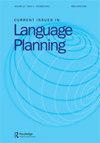Micro language planning in Mandarin-dominated Chinese language education: voices from dialect-background heritage learners in New Zealand
IF 1.8
1区 文学
Q2 EDUCATION & EDUCATIONAL RESEARCH
引用次数: 0
Abstract
The field of language policy and planning has seen increasing scholarly attention that explores social actors’ micro language planning towards a given language policy situation at the grassroots level. In educational contexts, teachers and educators are often considered pivotal locals whose agency, when enacted in micro language planning, can contribute to educational language policymaking. However, little attention has been given to learners – those on the receiving end of educational language policy. Situated in the current discourse concerning Mandarin-dominated Chinese language education, within the context of China’s promotion of Mandarin language learning, this study examines dialect-background heritage learners in a tertiary-level Mandarin Chinese language programme in New Zealand. By adopting the concept of micro language planning, this study explores how dialect-background heritage learners perceive and react in a Mandarin-dominated Chinese programme. The findings show that dialect-background learners exercise agency to interpret, implement, reject, and negotiate language policy according to their self-identified language needs. However, their ability to enact agency is also constrained by a series of social realities including socio-economic discourse, language ideology, language proficiency, and technology development. This study offers implications for language policy makers involved with different levels of Chinese language policy.以普通话为主导的汉语教育中的微语言规划:来自新西兰方言背景传承学习者的声音
语言政策和规划领域越来越受到学术界的关注,研究社会行为体在基层针对特定语言政策情况的微观语言规划。在教育背景下,教师和教育工作者通常被认为是关键的当地人,当他们的作用在微观语言规划中发挥作用时,可以为教育语言决策做出贡献。然而,教育语言政策对学习者的关注却很少。在当前以普通话为主导的汉语教育的语境中,在中国促进普通话学习的背景下,本研究调查了新西兰高等教育普通话课程中方言背景的传统学习者。本研究采用微语言规划的概念,探讨方言背景传承学习者在以普通话为主导的汉语课程中如何感知和反应。研究结果表明,方言背景的学习者根据自我认同的语言需求行使解释权、执行权、拒绝权和协商权。然而,他们制定代理的能力也受到社会经济话语、语言意识形态、语言能力和技术发展等一系列社会现实的制约。本研究为不同层次的语言政策制定者提供了启示。
本文章由计算机程序翻译,如有差异,请以英文原文为准。
求助全文
约1分钟内获得全文
求助全文
来源期刊

Current Issues in Language Planning
Multiple-
CiteScore
4.80
自引率
16.70%
发文量
26
期刊介绍:
The journal Current Issues in Language Planning provides major summative and thematic review studies spanning and focusing the disparate language policy and language planning literature related to: 1) polities and language planning and 2) issues in language planning. The journal publishes four issues per year, two on each subject area. The polity issues describe language policy and planning in various countries/regions/areas around the world, while the issues numbers are thematically based. The Current Issues in Language Planning does not normally accept individual studies falling outside this polity and thematic approach. Polity studies and thematic issues" papers in this journal may be self-nominated or invited contributions from acknowledged experts in the field.
 求助内容:
求助内容: 应助结果提醒方式:
应助结果提醒方式:


